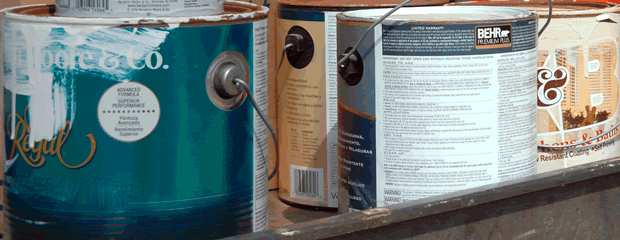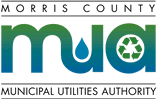Transfer Station Info (Tip Fee $113.00/ton)
- Mt. Olive Mon-Fri 7:30am-3pm; Sat 7:30am-11am
- Parsippany Mon-Fri 7am-3pm; Sat 7:30am-11am
- No Rental Trucks
- Payment by Account, Check, Credit Card. No Cash

F.A.Q. Paints and Stains
The MCMUA operates one of NJ's most comprehensive household hazardous waste (HHW) programs. This F.A.Q. page and information on hazardous materials is intended as a guide about HHW materials as well as the MCMUA's HHW program. This information is a general guide and does not constitute official rule, regulation or law.
Hazardous Waste Materials
- Adhesives
- Aerosols
- Antifreeze
- Appliances (CFCs)
- Art & Crafts
- Asbestos
- Batteries (Auto & Boat)
- Batteries, Household (dry cell)
- Cell Phones
- Compressed Gas Cylinders
- Driveway Sealer
- Electronics
- Fire Extinguishers
- Fluorescents
- Gasoline
- Medical Waste
- Kerosene
- Mercury
- Motor Oil & Filters
- Muriatic Acid (HCl)
- Paints & Stains
- Pesticides
- Photo Chemicals
- Pool Chemicals
- Propane
- Rock Salt
- Smoke Detectors
- Solvents
- Wood with Lead Paint
Hazards
- Latex paints are water based and after being dried out are acceptable for disposal with the ordinary trash. Click here for a brochure on discarding latex paint in the trash.
- Oil based paints and stains contain volatile organic compounds (VOCs) that vaporize at room temperature; vapors may be toxic when inhaled.
- Oil based paints and stains are flammable - store away from sources of sparks or heat.
-
Old oil based paints and marine paints may contain lead, PCBs, mercury, chromium or cadmium, all of which are toxic to humans, animals and the environment.
Handling
- Containers should be opened in a well-ventilated area. Wear appropriate respirator or cartridge mask when pouring off or mixing large volumes of oil-based paints.
- Identify leftover paint as latex or oil-based. Latex paint is labeled as such or has instructions to clean up with water. Oil based paint may be labeled "alkyd", "contains solvents", "clean up with mineral spirits" or "combustible."
- Pourable paint may be reused, unless it contains lead. To test if paint is still good, paint a small test area on clean surface and allow to dry for 48 hours. Place a piece of masking tape over the paint and pull off. If paint comes off on the tape, the paint is no longer good.
- To store usable paint for long periods of time, cover the opening of the paint can with a piece of plastic wrap and seal the lid tightly. Store the can upside down and away from heat.
- Do not store latex paint outside or in unheated area. Frozen latex paint cannot be reused.
- Do not put liquid paint in the trash or down the drain.
-
Do not dry out oil based paints, stains, or wood finishes to dispose of in the trash. The volatile chemicals are air pollutants.
Management Options
-
Surplus latex or oil-based paints (click here for a brochure on discarding latex paint in the trash):
- If the paint is usable and there is a reasonable quantity, try to donate it to a community service organization or theater group.
- Latex paint can be disposed of as trash if dry. To dry small amounts, remove lid and let the paint dry in the can. For larger amounts, mix in kitty litter or newspaper, or pour one-inch layers of paint in a cardboard box lined with a plastic bag. Stir the paint occasionally to speed drying. Put completely dried paint in the trash.
- Oil-based paint, hardened or not, cannot be disposed of in the trash and needs to be delivered to a HHW disposal program.
- If no reuse or recycling option is available or convenient for oil-based paints, they should be saved for a HHW collection.
-
Paints that contain lead, mercury, chromium or cadmium:
- Do NOT use up and do NOT give away. Toxic metals will remain in paint.
- Take to municipal paint collection program, if accepted, or save for a HHW collection day or take to a commercial hazardous waste facility.
-
Empty paint cans:
- Empty paint cans may be accepted in community scrap metal programs
- If recycling is not feasible, empty paint cans can be disposed of in the trash. Leave lids off so the hauler can see that the can is empty.


